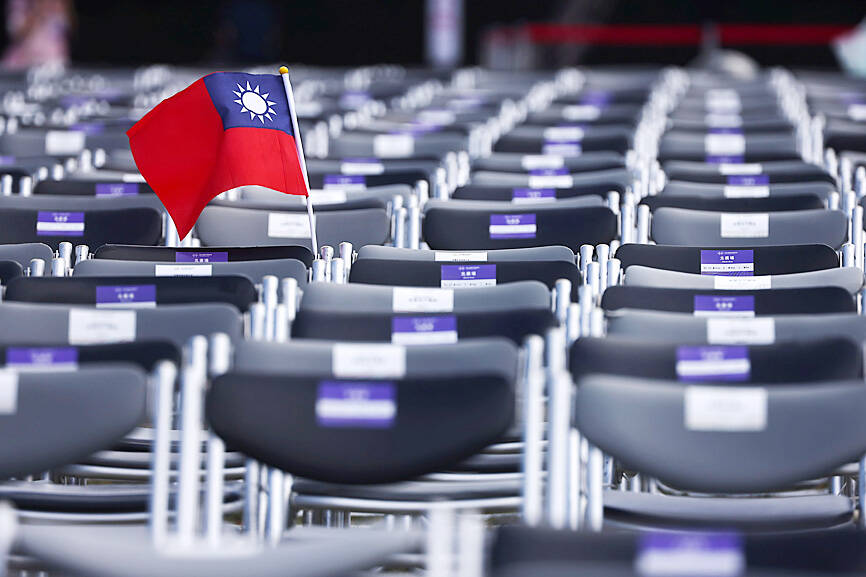The secretary-general of the World Medical Association (WMA), a confederation of more than 100 national medical associations, yesterday called on the WHO to end its continued exclusion of Taiwan.
During a keynote speech at this year’s NGO Leaders Forum in Taipei, WMA secretary-general Otmar Kloiber said his non-governmental organization (NGO) had long supported Taiwan’s inclusion in the WHO and participation in the World Health Assembly (WHA), the WHO’s annual decisionmaking meeting.
Due to its advocacy on Taiwan’s behalf, the WHO has threatened to revoke the WMA’s membership in the multilateral body, Kloiber said, adding that WMA observers with Taiwanese passports had been routinely denied entry to UN premises since 2017.

Photo: Ann Wang, Reuters
He said such “ridiculous” actions hurt not just the WMA, but also the WHO itself by forgoing the benefits of power, experience and humanitarian help from Taiwan.
“We see ourselves as advocates for healthcare everywhere, and the meaningful participation of knowledge is something which we believe is absolutely necessary to have complete inclusion,” Kloiber said. “And we hope that we can make a difference and get a reconsideration by the World Health Organization to have finally Taiwan included and participating in a very meaningful way.”
Taiwanese representatives were expelled from the WHO in 1972, one year after the People’s Republic of China was recognized as the sole representative of China by the UN.
During the administration of former Chinese Nationalist Party (KMT) president Ma Ying-jeou (馬英九) from 2009 to 2016, Taiwanese delegates, participating under the name Chinese Taipei, were granted observer status at the WHA.
Since then Taiwan has been excluded from the WHA due to opposition from China.
The NGO Leaders Forum was opened with remarks from Vice Minister of Foreign Affairs Alexander Yui, who said that it was the third consecutive year that the Ministry of Foreign Affairs had hosted an international forum to facilitate dialogue between the government and NGOs from Taiwan and abroad.
More than 600 participants from NGOs, government officials, business representatives and other guests had already taken part in this “meaningful event,” Yui said.
This year’s forum focused on the challenges and opportunities for a Taiwanese public-private partnership promoting peace and justice in global governance.

Right-wing political scientist Laura Fernandez on Sunday won Costa Rica’s presidential election by a landslide, after promising to crack down on rising violence linked to the cocaine trade. Fernandez’s nearest rival, economist Alvaro Ramos, conceded defeat as results showed the ruling party far exceeding the threshold of 40 percent needed to avoid a runoff. With 94 percent of polling stations counted, the political heir of outgoing Costa Rican President Rodrigo Chaves had captured 48.3 percent of the vote compared with Ramos’ 33.4 percent, the Supreme Electoral Tribunal said. As soon as the first results were announced, members of Fernandez’s Sovereign People’s Party

EMERGING FIELDS: The Chinese president said that the two countries would explore cooperation in green technology, the digital economy and artificial intelligence Chinese President Xi Jinping (習近平) yesterday called for an “equal and orderly multipolar world” in the face of “unilateral bullying,” in an apparent jab at the US. Xi was speaking during talks in Beijing with Uruguayan President Yamandu Orsi, the first South American leader to visit China since US special forces captured then-Venezuelan president Nicolas Maduro last month — an operation that Beijing condemned as a violation of sovereignty. Orsi follows a slew of leaders to have visited China seeking to boost ties with the world’s second-largest economy to hedge against US President Donald Trump’s increasingly unpredictable administration. “The international situation is fraught

MORE RESPONSIBILITY: Draftees would be expected to fight alongside professional soldiers, likely requiring the transformation of some training brigades into combat units The armed forces are to start incorporating new conscripts into combined arms brigades this year to enhance combat readiness, the Executive Yuan’s latest policy report said. The new policy would affect Taiwanese men entering the military for their compulsory service, which was extended to one year under reforms by then-president Tsai Ing-wen (蔡英文) in 2022. The conscripts would be trained to operate machine guns, uncrewed aerial vehicles, anti-tank guided missile launchers and Stinger air defense systems, the report said, adding that the basic training would be lengthened to eight weeks. After basic training, conscripts would be sorted into infantry battalions that would take

GROWING AMBITIONS: The scale and tempo of the operations show that the Strait has become the core theater for China to expand its security interests, the report said Chinese military aircraft incursions around Taiwan have surged nearly 15-fold over the past five years, according to a report released yesterday by the Democratic Progressive Party’s (DPP) Department of China Affairs. Sorties in the Taiwan Strait were previously irregular, totaling 380 in 2020, but have since evolved into routine operations, the report showed. “This demonstrates that the Taiwan Strait has become both the starting point and testing ground for Beijing’s expansionist ambitions,” it said. Driven by military expansionism, China is systematically pursuing actions aimed at altering the regional “status quo,” the department said, adding that Taiwan represents the most critical link in China’s